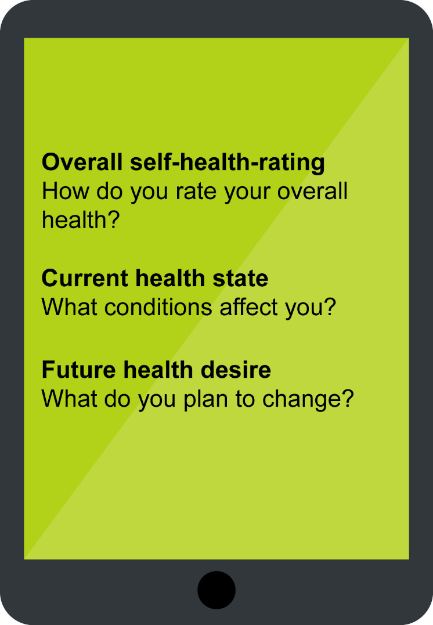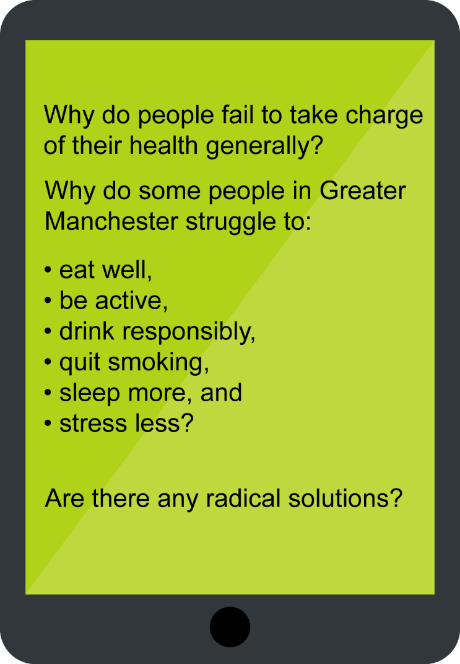We used two primary tools to create insight:
Our snapshot survey
The snap s hot survey was designed not only to capture demographic information but as an analytical tool in itself. In addition to demographics, it was composed of three parts:
hot survey was designed not only to capture demographic information but as an analytical tool in itself. In addition to demographics, it was composed of three parts:
- a simple scaler question that asked participants to rate their overall health;
- the healthily behaviours framework embedded with Public Health England’s “One You” campaign to ask participants to report their current personal health state – essentially exploring unhealthy behaviours and conditions; and
- the same framework to ask participants about their personal health desires – essentially the behaviours or conditions they would like to change.
Personal health state:
- I don’t eat well I am not physically active enough
- I smoke
- I drink too much
- I don’t check my own health (e.g. moles, breasts, testicles)
- I don’t get enough sleep
- I have too much stress in my life
- I have a long term health condition (e.g., diabetes, asthma, depression)
- I have two or more long-term health conditions (e.g., diabetes, asthma, depression)
- I have other health issues
- None of the above
- Rather not say
Personal health desires:
- I want to eat more healthily
- I want to be more physically active
- I want to stop smoking
- I want to stop drinking/drink responsibly
- I want to check my own health more often
- I want to get more sleep
- I want to have less stress in my life
- I want to be healthier generally
- None of the above
- Rather not say
The snapshot was designed in this three-part format by Clever Together as this is an approach used to mine data for signals and patterns that can help cluster people into definable groups. It enables analysts to explore differentials between responses. For example, one would expect, the tally of unhealthy behaviours and conditions to be lower (i.e., a better personal health state), on average, for people who report they are generally healthy, as would their desire, on average, to change their behaviour. However, this wasn’t the case, as we’ll explain shortly.

The Taking Charge Together online workshop was designed to give the public the opportunity to:
- express why they believe so many people fail to take charge of their health and
- share any radical ideas they may have for helping people to take charge of their own health.
To achieve this aim we structured our online workshop into eight discussion areas, primarily aligned with the Public Health England #OneYou campaign:
Helping people be healthy – searching for radical ideas
What radical ideas do you have or have you seen that can help people or communities to take charge of their own physical and mental health?
General health
Why do so many people in Greater Manchester fail to take charge of their own health generally?
Eat well
- Why is it that some people in Greater Manchester struggle to eat well (e.g., over or under eating, not eating enough food and veg)?
Be active
- Why is it that some people in Greater Manchester struggle to be active (e.g. being physically active for more than 2 hours a week)?
Drink responsibly
- Why is it that some people in Greater Manchester struggle to drink responsibly (e.g. keeping under 14 units of alcohol a week – the equivalent to 6 pints of beer, 6 glasses of wine)?
Quit smoking
- Why is it that some people in Greater Manchester struggle to quit smoking?
Sleep more
- Why is it that some people in Greater Manchester struggle to regularly get enough sleep?
Stress less
- Why is it that some people in Greater Manchester struggle to reduce their stress levels?
Our online workshop
Between 15th February and 31st March, 3,737 people joined the public online workshop, 20% of which became “most active” participants, sharing 4,537 ideas comments and votes across the 8 challenge questions.
The benefit of using an online workshop is that we have a digital record of what people think and say that can be mined for themes and signals using the latest qualitative research techniques. This means we avoid the risks in typical workshops of the facilitator cherry-picking the data or participants feeling too embarrassed to say what they really feel in front of their peers.
We’ve been asked “is this digital approach better suited to younger people?”. The data showed this was not the case. While 31% of the people who completed the snapshot were under 35, only 15% of those who were the most active in the online discussion were under 35. Conversely, 55% of the active online workshop participants were aged 45 to 79, whereas only 33% fell into this age range in the snapshot survey. It would seem our methods empowered older people, despite the concerns of some.
Click here to read about our findings.